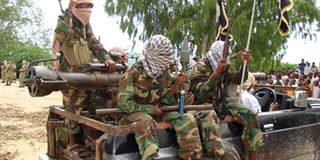UN links Kenya to Somali rebels

Members of the hardline Al Shabaab Islamist rebel group sit on a pick-up during a demonstration in Mogadishu. A UN report says Kenyans account for about half of all foreigners fighting in Somalia under the banner of al-Shabaab. Photo/FILE
Kenya is “a major base” for rebels battling the Somali Transitional Federal Government, a UN report says.
The report also details Kenya’s training of TFG forces — in apparent violation of a UN embargo. It says Kenyans account for about half of all foreigners fighting in Somalia under the banner of al-Shabaab.
Many of these fighters are recruited through a network in Nairobi consisting of “wealthy clerics-cum-businessmen,” the UN Monitoring Group on Somalia says in the March 10 report.
Illegal migrants
Leaders of al-Shabaab and Hizbul Islam, the other main rebel group, “travel with relative freedom to and from Nairobi where they raise funds, recruit and obtain treatment for wounded fighters,” the report says.
Some African and European diplomats in Nairobi, meanwhile, engage in visa fraud to enable illegal migrants to be smuggled into Europe for fees of about Sh925,000 for a man and Sh1.2 million for a woman, the UN says. The ambassador of an African country reportedly plays a key role.
The Nairobi embassy of another country in the Horn of Africa is said to funnel cash to insurgents in Somalia monthly. “An estimated $1.6 million may have passed through Kenya.”
The report criticises Kenya for not cooperating with the UN on breaches of an arms embargo slapped in 1992. “One notable exception,” the report says, “was the Kenya Police Criminal Investigations Division, which provided valuable assistance.”
The report points to Kenya’s training last year for the TFG of 2,500 youths recruited in Somalia and northeastern Kenya, including Dadaab camps. Officials acknowledged training TFG police, but “denied any other type of training.”
The report says training involved “irregularities,” like recruitment of children and Kenyans as well as “false promises of financial remuneration.”
In detailing connections between Somalis in Nairobi and the rebels, the report names several mosques in the Kenyan capital. It describes a 31-year-old cleric “believed by the government of Kenya to have obtained Kenyan nationality under false pretences,” as a key leader of one such mosque.




